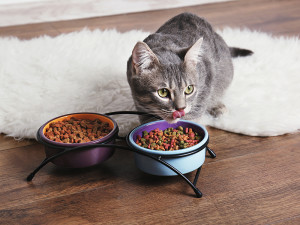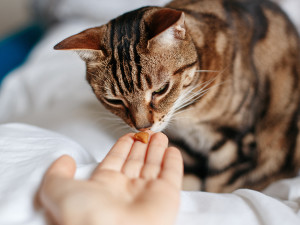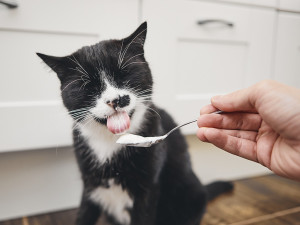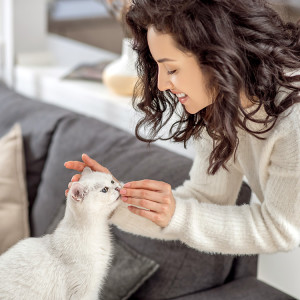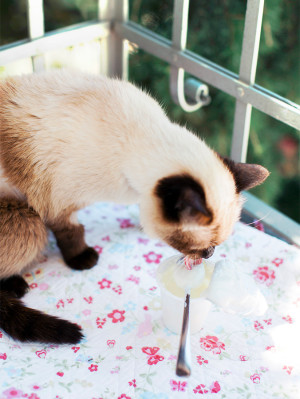Does Your Cat Have Irritable Bowel Syndrome (IBS)?
And how to help them if they do.

Share Article
In This Article:
What Is Inflammatory Bowel Disease in Cats? Irritable Bowel Syndrome vs. Inflammatory Bowel Disease in Cats Symptoms of IBS in Cats Causes of Irritable Bowel Syndrome How Is IBS in Cats Diagnosed?
Many cat parents have reasons for dreading vet visits. Maybe your cat gets carsick, hides for days afterwards, or just hates strangers. Maybe your experience sounds like this: My cat gets super stressed when I take him to the vet. He doesn’t bite, scratch, or cry. But without fail, there’s an explosion of diarrhea when we get home — sometimes even before we get home. Then I’m stuck bathing my stressed-out, diarrhea-soaked cat. I hate it. He hates it.
If that sounds familiar, you’re not alone, and you have my sympathy. It’s possible your cat has irritable bowel syndrome.

Irritable bowel syndrome vs. inflammatory bowel disease in cats
It’s very common for the terms irritable bowel syndrome (IBS) and inflammatory bowel disease (IBD) to be used interchangeably, but they shouldn’t be. Although both diseases can result in very similar symptoms, there are differences in their underlying causes and their impacts on the gut.
Inflammatory bowel disease
IBD in cats is caused by chronic inflammation of the intestinal tract, often driven by an abnormal immune response. When intestinal walls are examined microscopically (via biopsy), they show the presence of inflammatory cells and structural changes that are consistent with chronic inflammation. These changes interfere with the gut’s ability to absorb nutrients, maintain appropriate water balance, and tolerate changes in the microbiome. Cats with IBD often require life-long care to manage their symptoms. Over time, chronic gastrointestinal issues can lead to weight loss and malnutrition.
Irritable bowel syndrome
IBS, on the other hand, is considered a functional disease. When the digestive system works at the right pace, the body can break down food, absorb nutrients, remove enough moisture to create formed stool, and leave enough moisture so that the formed stool can pass easily. IBS primarily affects gut motility — causing food to either pass through the intestines too quickly (causing diarrhea) or too slowly (leading to constipation). Intestinal muscles can spasm, causing abdominal discomfort. While some cats with IBS can develop inflammation in their gut, structural abnormalities may be absent on biopsy.
Even with these slight differences between IBD and IBS in cats, people aren’t necessarily wrong if they alternate between saying a cat has IBD and IBS — cats can have both.
Symptoms of IBS in cats
Diarrhea is one of the primary signs of IBS in cats. I know, it seems like damn near everything can cause diarrhea in cats — intestinal disease, organ dysfunction, toxin ingestion, you name it. Well, just add irritable bowel syndrome to that list. Irritable bowel syndrome and inflammatory bowel disease in cats have symptoms that are very similar — gastrointestinal symptoms that can come and go. IBS in cats has symptoms that can include:
Soft stool
Diarrhea
Bloody diarrhea/Blood in the stool
Constipation
Abdominal pain
Gas
Bloating
Stomach rumbling
Nausea
Vomiting
Decreased appetite
Causes of irritable bowel syndrome in cats
Stress is the primary trigger for IBS in cats. Symptoms will consistently show up after a stress-inducing incident. For example, that explosive diarrhea after a trip to the vet, straining in the litter box after a thunder storm, or piles of vomit after visitors come by. Anything that causes fear or anxiety for your cat can affect their gut motility and cause symptoms. Common triggers include:
Car rides or travel
New people
New pets
Moving homes
Loud noises
Boarding
Separation anxiety
Diet changes
How is IBS in cats diagnosed?
There’s not a specific test to diagnose irritable bowel syndrome in cats. It tends to be a diagnosis of exclusion, meaning your vet will have to rule out all of the other conditions that can cause similar symptoms.
Not every test is performed right away, but if symptoms persist or worsen, more advanced testing may be recommended. Common diagnostic tests that may be performed to rule out other possible causes of gastrointestinal symptoms include:
Blood work: Blood work can help rule out organ dysfunction like chronic kidney disease or endocrine conditions like diabetes and hyperthyroid disease.
Fecal exam: A fecal exam can rule out common intestinal parasites like coccidia, hookworms, roundworms, and Giardia.
Imaging: Radiographs (X-rays) and ultrasound can evaluate the appearance of the abdominal organs and gastrointestinal tract.
Food trial: A food trial can help rule out possible food allergies.
Biopsy: For an intestinal biopsy, small pieces of the intestines are removed for microscopic examination. This test can reveal the presence of abnormal cells or signs of chronic inflammation. This test is how inflammatory bowel disease is diagnosed in cats.
Endoscopy: During endoscopy, a small camera is passed down the esophagus and into the stomach and small intestines. This allows the vet to take a look for inflammation and irritation in the stomach and intestinal walls. A biopsy can be performed during the endoscopy procedure.
When to seek expert help
It’s not uncommon for a cat to have the occasional bout of diarrhea. But if a cat is experiencing painful gastrointestinal issues every time there is the slightest change in their routine, they should be seen by a veterinarian for diagnosis and proper treatment. Have your cat seen by a vet if your cat has:
A pattern of stress-related diarrhea
Large amounts of watery diarrhea
Blood in the stool
Abdominal pain
Straining in the litter box
Vomiting
Lethargy
Poor appetite
How to treat IBS in cats
Treatment for IBS depends on the severity of the condition, but the focus is to get the gastrointestinal symptoms under control and make sure your cat is comfortable. If your cat is having a bout of irritable bowel syndrome, treatment may include:
Fluid therapy to improve hydration
Bland diet (temporary)
Antidiarrhea medications
Treatment for constipation
Antibiotics (only if necessary)
Diet can also play a role in managing the symptoms of IBS in cats. Increasing fiber intake can help cats pass normal stool and maintain a healthy gut flora.
One of the main focuses of long-term management of IBS in cats is to anticipate and reduce the impact of triggers. Pheromones could help relieve anxiety in some cats. Management can also include a conversation with your vet about prescribing a light sedative to give before car rides and vet appointments.
Bottom line
Irritable bowel syndrome in cats causes intestinal dysfunction, leading to diarrhea and discomfort. Diagnosing IBS involves ruling out other conditions, including inflammatory bowel disease, which can look similar. IBS in cats is typically stress-induced, so treatment involves reducing stress and providing symptomatic care when issues arise.
References
British Veterinary Association. “IBD or IBS: Does Irritable Bowel Syndrome Exist in Cats?” British Veterinary Association, 2016, www.bva.co.uk/news-and-blog/blog-article/ibd-or-ibs-does-irritable-bowel-syndrome-exist-in-cats/?ref=petcube.comopens in new tab. Accessed 27 Apr. 2025.
Burns, Kara M. “Feline IBD: Pathophysiology, Treatment Goals, & Client Communication.” https://www.isvma.org/wp-content/uploads/2023/02/Feline_ibd_pathophysiology_treatment_goals_and_client_communication.pdfopens in new tab.
Lilly, M. Leanne. “Irritable Bowel Syndrome: IBS= It’s 'Bout Stress.” Western Veterinary Conference 2023.

Dr. Alycia Washington, DVM, MS
Alycia Washington is a small-animal emergency veterinarian with over 10 years of experience based in North Carolina. She works as a relief veterinarianopens in new tab and provides services to numerous emergency and specialty hospitals. She also works as a veterinary writer with a focus on educating pet parents.
Related articles
![A cat licking yogurt from a spoon.]()
6 Best Cat Probiotics
Is your cat’s microbiome out of whack? It may be time to add probiotics to their diet.
![Woman giving her white cat a vitamin.]()
Does My Cat Need Supplements?
![A woman feeding food to her cat at a dining room table]()
Is Homemade Cat Food Good for Your Kitty?
The best ingredients to include when considering a home-cooked diet for your cat.
Gassy Kitty? Here’s Why Your Cat Keeps Farting
Things are getting pretty stinky. What should you do?
![cat being offered a treat or vitamin]()
The Best Supplements and Vitamins for Cat Health
Not your mama’s multivitamin.
Can Cats Eat Yogurt?
A small amount is fine—but keep a close eye on the ingredients list.

